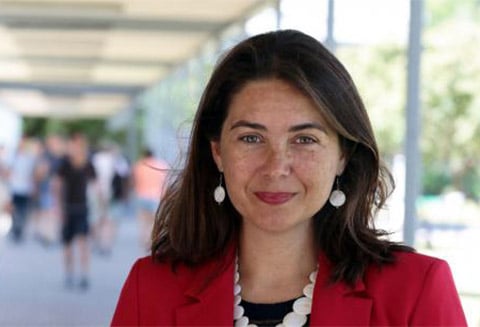In October 2020, Chileans took to the streets. 
This time, they weren’t protesting the nation’s rampant inequality and unsustainable cost of living. Nor were they demanding changes to their dictatorship-era constitution, as they had throughout 2019.
This time, they were celebrating.
As the results of a referendum rolled in, and it became clear that 78 percent of voters supported the writing of a more equitable constitution, they sobbed and cheered and waved flags. In the nation’s capital, Santiago, someone projected a single word onto the side of a building: Rebirth.
Today, Lucia Dammert (GSPIA ’97) is at the center of that rebirth as the chief of advisors to President Gabriel Boric. At 36, Boric is the youngest president in Chile’s history. His historic administration includes many women and members of the LGBTQ+ community, rarities in the country’s male-dominated and conservative political realm. And, because they make up the first government to serve under a new constitution, they will shape the future.
“Everything is possible with this young, bright team,” Dammert says. “With this government, we can show the rest of Latin America there’s a different way to govern, a different way to exercise politics.”
Dammert was born and raised in Peru and studied sociology at the Universidad Nacional de Cuyo in Argentina. Shortly after earning her bachelor’s degree, she arrived in Pittsburgh to join Pitt’s Graduate School of Public and International Affairs.
She chose Pitt largely because of its renowned Center for Latin American Studies, even earning one of the center’s prestigious fellowships. But GSPIA also helped her develop a greater understanding of the world beyond Latin America. The issues facing that part of the globe weren’t unique and localized, she discovered; they were universal and required bigger thinking if they were to be conquered.
“I realized that in order to tackle huge problems, we needed access to the political wheel at a higher level,” she says.
Her ensuing career, which centered on public safety, organized crime, and criminal justice reform, reflects that kind of big thinking. Over the past two decades, she has held advisory positions linked to security issues in Chile, Argentina, and México and has served as an advisor on both the Organization of American States and the UN Secretary General´s Advisory Board on Disarmament Matters.
Most recently, she worked as a professor of international relations at the Universidad de Santiago de Chile, a job she will return to after Boric’s four-year term concludes. Her university research resulted in the international publication of three books on public security and more than 80 papers, making her a well-known and well-regarded expert.
But it was her articulate and outspoken support of cultural reform that made her a national star and earned her a place in Boric’s administration. She became a familiar face on Chilean news networks and regularly sounded off on social media with tweets such as these:
“Beautiful people of my [timeline] do not get involved with xenophobes, misogynists or liars … join millions of Chilean men and women who share the idea of a better country!”
“It is an excellent step and shows the need to build an ‘us’ where nobody is superfluous and everyone has the opportunity to speak and be heard.”
Her new position as chief of advisors allows her to play a key role in developing the “better country” that she envisioned. She leads a team of about 30 experts and researchers who compile the opinions, documents, and reports that drive the president’s policies and help him make decisions.
“My goal is for the president to be successful in achieving a feminist government that respects the environment and has important Latin American leadership,” Dammert says.
But success is a fragile concept in Chile. Although the government is changing, the people are energized, and the country is moving toward equality, dozens of protesters died and thousands more were injured or arrested to make it all possible.
That gap between believing something needs to change and actually making that change happen is wide, Dammert acknowledges, but she knows from experience that it can be bridged. She witnessed it right here in Pittsburgh, and she’s following that model now.
Her professors at GSPIA were not just researchers; they were changemakers who took time out of the classroom to work in the world. They consulted on economic and foreign policy issues at the White House. They served on United Nations task forces to prevent genocide and lead conflict resolution. They tackled issues of privacy and national security at the State Department and the CIA.
“Books are not enough,” Dammert says. “Academics need to be related to the problems we have on our streets and applied there. In order to learn something, we can’t just be in the classroom. We have to volunteer and step forward; otherwise, the reality passes us by.”
This article was originally published by the Pitt Connection, Pitt Alumni Association's monthly e-newsletter. Click here to view the July 2022 edition.